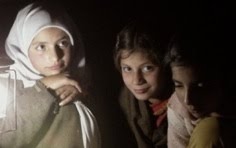 Traditionally, the wisdom of the world's cultures has been conveyed through story, helping explain our world and our place in it – enabling us to develop as persons, create community, solve problems, ignite creativity and imagination, discover meaning and teach, nurture and influence younger generations.
Traditionally, the wisdom of the world's cultures has been conveyed through story, helping explain our world and our place in it – enabling us to develop as persons, create community, solve problems, ignite creativity and imagination, discover meaning and teach, nurture and influence younger generations.Storytelling not only directed individuals and communities to what was precious and what they needed to hang on to – it also taught us the ‘other side’ of life: to live with change and how to learn from it.
Night-shadows signaling the day's end, or in some communities, the longer winter evenings, were assigned as the times for story-listening. As one Teller friend laughingly put it: “The art of storytelling evolved naturally, because some people preferred telling tales and other preferred listening to them.”
Traditional cultures the world over revered good stories and storytellers. While storytelling was a part of every household, there was a special place for accomplished storytellers, who, after years of specialized training set out to invite, enchant, inspire and teach their people.
The stories told were tales of meaning; of how the world was created, how evil forces entered the world and had to be confronted, of heroes and heroines who embarked on transformative journeys, of how seemingly weaker people would succeed, even when they were less rich or less powerful.
Often the main characters had to learn to listen, to accept magic, to go on quests, undertake difficult challenges, make moral choices or listen to helpful creatures and guides who appeared along the path. Time and again a seeker returned safely, giants and dragons were subdued, the community was saved, the people renewed.
In “The White Goddess: A Historical Grammar of Poetic Myth”, Robert Graves tells us that in ancient Ireland, the ollave, or master-poet, sat next to the king and was privileged, as none but the queen was, to wear six different colors in his clothes. The ollave also held the respected position of judge and seer, and tutored the king in morality.
In Turkey and Azerbaijan, the singing storytellers or troubadors were called ashiks, a word from Arabic meaning 'lover', which describes someone who is a musician, poet and storyteller.
In the Mali and Guinea and the Gambia, the jalis or griots were and are the community’s historians, with skills to draw a village or people closer - one known way is by “giving them courage” through the tellings.
We in India fortunately have many story-telling Traditions still around – the Pandvani, Harikatha, the Baul, the Villu-Pattu, the Rathva, Burra Katha, Powada and many more. Alive in smaller towns and villages, and brought to city-dwellers as part of ‘cultural’ or ‘art’ events, it is still very difficult for most children of these Tellers to continue the tradition and choose it as a viable career. Sadly, these custodians of what is precious to our societies are finding it increasingly hard to keep these Traditions alive or revived without our active interest and support.
That may be the bad news, but the good news is that the world over people are recognizing the power of story-telling and story-sharing in different arenas of life, and actively working to revive it.
In Peshawar, Qissa Khwani translates as the Storyteller's Bazaar. This used to be the site of camping ground for caravans and military adventures, where professional story-tellers recited ballads and tales of war and love to throngs of traders and soldiers in the evening, in the many tea-shops. Today the place is know by the same name, but is full of traffic, shops and noise, with no live tellers in sight. However, in this busy market, storytelling cassette tapes now sell briskly, helping listeners to remember the past and tellers to find new audiences.
In the square of Jemaa al-Fna in theMoroccan city of Marrakesh,.you can still find a story-teller or a halaka who tells ancient stories that have been handed down from generation to generation. No doubt tourism has helped keep this going, often as a curiosity - but we learn to be grateful even for these small things.
With modern technology offering new forms of diversion and entertainment, "Young Moroccans would rather watch TV soap operas than listen to a story-teller much less become one themselves," and the tradition is dying out. A friend tells me that only six years ago there used to be around twenty halakis in the square, and now he finds only barely half a dozen - and they are all very old men.
A concerned group has in recent years managed to block projects like a tall glass tower and an underground garage in the square, where cars have now been banned.
However UNESCOhas intervened to try to save the stories as part of the world's oral heritage, even recording some of them on the internet, so modern technology may yet come to the rescue of these wondrous tales.
May we find ways to support and encourage the storytellers we come across, and play a role in nurturing this wonderful tradition.
Marguerite Theophil
(See also ‘THE STORY-MAN’)
The telling of our stories is as basic, important and necessary as
our personal freedoms, yet, sadly, also as threatened. When not practiced and
protected, stories are lost to obscurity and knowledge itself is placed in jeopardy.
~ Waddie Mitchell
our personal freedoms, yet, sadly, also as threatened. When not practiced and
protected, stories are lost to obscurity and knowledge itself is placed in jeopardy.
~ Waddie Mitchell
